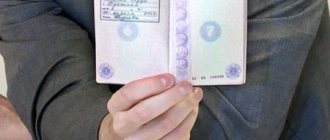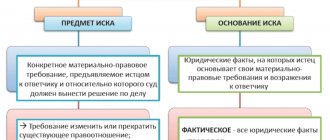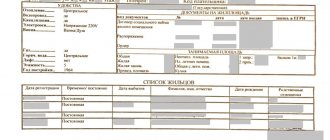Where to go first?
If there is a need to remove a child from an apartment by court, first obtain two documents:
- Certificate of persons registered in the apartment. It will indicate exactly who is registered, from what time and in what relationship with the owner of the property. This document must be attached to the claim with a request to discharge the minor from the living space. You can get a certificate from the Criminal Code, Homeowners Association, passport office at your place of residence, or the police department.
- An extract from the Unified State Register of Real Estate about registered rights to the apartment. Thanks to her, it will become clear whether this child is the owner or just lives in the apartment. If the owner, it is impossible to write it out through the court.
Armed with these documents, you can begin preparing documents for the court. To do this, you need to decide on the grounds for the discharge (they must be specific and significant), the legislative framework and evidence in the case.
Stage No. 5 - We wait for the court decision to come into force and discharge the defendant
The law has a deadline for the entry into force of a court decision - Art. 210 Code of Civil Procedure of the Russian Federation. For what? So that the defendant has time to file an appeal to challenge the decision to a higher court - Art. 320 Code of Civil Procedure of the Russian Federation.
How long? In-person decision - if the defendant does not file an appeal, it will come into force in a month (clause 1 of Article 209 and Article 321 of the Code of Civil Procedure of the Russian Federation). The month must be counted from the date of the final court decision. The date is indicated in the court decision itself. For example, “The reasoned decision was made on such and such a date” or “The decision in a reasoned form was made on such and such a date.”
With an absentee decision it is different - it comes into force 7 days after the defendant received it, but did not appeal - clause 1 of Art. 244 and paragraph 1 of Art. 237 Code of Civil Procedure of the Russian Federation. What if he doesn't take the default judgment? In such a situation, it will come into force 1 month and 10 days after its adoption in final form - paragraph 14 of the Review of Judicial Practice of the Supreme Court No. 2 (2015) dated June 26, 2015. But it's better to wait 1.5 months.
When the court decision comes into force, plaintiffs need to take a copy of it to the passport office. The passport officer will pick it up. As a result, you need to get a new extract from the house register, in which the defendant will no longer be on the list of registered ones.
The court itself will send a copy of the decision to the regional migration department at the regional Ministry of Internal Affairs (formerly the Federal Migration Service), i.e. there is no need to go to them.
Who is right?
A lot of situations may arise when a minor child remains registered in the apartment. For example, the seller moved with his family from their home to a new apartment, but did not release the children because guardianship did not allow him.
It is difficult to discharge a child through the court, but it is possible. As you prepare for trial, keep a few things in mind:
- young children (under 14 years old) must be registered with their parents;
- It will not be possible to discharge the child “to nowhere”; you will have to look for an alternative address or prove that the child actually lives in another place;
- housing at a different address should not be worse than the previous one.
The difficulty is that children are very seriously protected by the state, and every child must have a home, sometimes even to the detriment of the rights of other citizens.
Differences in the process before and after 14 years
At the age of 14, a minor gains partial legal capacity. The child gets the opportunity to make some decisions independently. When discharging children of different ages, it should be taken into account that:
- an application for deregistration of a child under 14 years of age is filled out by one of the parents and submitted on his behalf;
- Children over 14 years of age fill out the extract form independently and sign it themselves.
The presence of a legal representative at discharge is mandatory in both cases.
The most common reasons:
- The apartment has been sold or alienated in any other legal way. In this case, all residents’ right to use the sold living space is terminated. This is stated in paragraph 1 of Art. 35 Housing Code of the Russian Federation.
- In fact, the family lives at a different address and simply refuses to leave.
- There is no information about the location of the parents.
- Further cohabitation is impossible, since a threat is created to the interests of the child.
- The child and his parents never lived in this apartment.
- The child was registered in the apartment fictitiously.
Underwater rocks
When discharging a minor, the following nuances must be taken into account:
- If the child does not live in the apartment, this must be indicated in the statement of claim. You should also indicate the address of the minor’s actual location if it is known.
- The summons to court arrives at the defendant’s place of residence. Accordingly, if the new address of the minor and his parents is unknown, then notifications will be sent to the disputed apartment where they are registered. The court will still consider them notified of the place and date of the hearing. If the defendant does not attend the hearing, a default judgment may be entered.
- Drawing up a claim requires legal knowledge. Experts recommend indicating in the text references to regulations that were violated by the defendant.
A child who cannot be evicted even through court
There are also minors who cannot be discharged even through the court, even if there are good reasons. These include:
- children-owners of housing (those who are indicated as copyright holders in the extract from the Unified State Register or certificate of ownership);
- those living under a will (if the testator prescribed their right to live in the will) - even if the apartment was sold to a new owner;
- minors under 14 years of age, if they do not have an alternative residential address;
- children who refused to privatize the apartment;
- the child does not temporarily live in the apartment for a good reason - he is being treated somewhere or studying;
- the owner of an apartment or share will not be able to register his minor child (son or daughter) or grandson/granddaughter.
In these cases, you will either have to wait until the child reaches the age of majority, or negotiate the voluntary discharge of the child with his parents, or change the title owner.
Child protection
The consent of the guardianship authorities is necessary for transactions with real estate - sale, exchange, exchange, rent, etc. That is, it is impossible to discharge a child from the apartment being sold, if he is one of the owners, without the permission of the authorized authorities. Also, the consent of the PLO will be required if the apartment from which you are being discharged is municipal.
Important! If the move has a negative impact on the child, a refusal will be received from the guardianship authorities (another school, inability to attend clubs, sections, etc.).
What is needed for registration
Required documents:
- application for re-registration;
- passports, birth certificate (up to 14 years);
- documents on ownership of both apartments (the one being sold and the one being bought);
- technical passports of both apartments to compare living conditions;
- personal account and social rental agreement (for municipal housing);
- a certificate from the passport office (stamp in the passport) confirming the current registration.
If parents live separately, they must come together. The consent of the second parent in writing, certified by a notary, is acceptable. The application and submitted documents are reviewed within 14 days.
For your information! A waiver from the guardianship authorities will be obtained if the living conditions in the new house are worse (with the exception of divorce and division of property).
Legislative basis
Laws governing registration/discharge issues, including when a child is required to be discharged from an apartment by court:
- International “Convention on the Rights of the Child” of November 20, 1989 (Article 9).
- Law No. 5242-1 of March 25, 1993 “On registration of citizens of the Russian Federation.”
- Federal Law No. 48 of August 24, 2008 “On guardianship and trusteeship.”
- The right of a guardian or trustee to represent the interests of a minor ward in court (Article 37 of the Civil Code of the Russian Federation).
- The need to alienate rights to real estate only with the consent of the guardianship and trusteeship authorities where the minor child lives is, for some cases, enshrined in clause 4 of Art. 292 of the Civil Code of the Russian Federation.
- The statute of limitations for eviction or deregistration of a child is 3 years (on a general basis), more than 3 years (special terms), no longer than 10 years (counted from the date of violation of the right). An indication of the deadlines is given in Art. 196 of the Civil Code of the Russian Federation and Art. 197 Civil Code of the Russian Federation.
Important! The guardianship and trusteeship authorities or the prosecutor's office have the right to appeal any illegal actions regarding the removal of a minor from the apartment.
Conditions for removing a minor from registration of place of residence
A known difficulty in such cases is finding an alternative address for registering the child. Discharge from the living space occurs only together with the discharge of one of the parents or guardian.
The living space allocated to the child for the next registration must be suitable in size and meet all the requirements for normal living. If, when trying to discharge a minor through the court, documents on the new property (residence address) are not attached to the claim, then the case may be refused.
Note! If the living conditions of a minor deteriorate, the guardianship and trusteeship authorities have the right to appeal the deregistration even if the child is not the owner of the home . Members of the commission of the guardianship department of the administration will conduct a study of living conditions and draw up an act.
For example, parents filed for divorce, mother and child began to live in too small a living space. The court may recognize the fact of violation of the child’s interests and force the father to place the child in his apartment again.
How to write a statement
Registration in Russia is of a notification and declarative nature. Registration and discharge are usually carried out on the basis of an application filled out according to the approved form.
It must be filled out correctly and not contain errors, corrections, or blots that make it difficult to read or understand. The document is filled out in Russian. It requires indicating the address of the premises from which the deregistration is being carried out, information about its owner and the tenant being deregistered.
You can submit an application in person, by mail, or electronically through the government services portal. Documents can be submitted through a representative with the appropriate power of attorney. A sample application can be found at the link below.
Download application form for discharge
. ⇐
A couple of pre-trial nuances
In some cases, before going to court, you need to change the title owner of the apartment. This is necessary if the plaintiff and the child are related - parents and children, grandparents and grandchildren, even aunts/uncles and nieces. The new owner must not be a relative of the child.
It also happens that defendants need to send a pre-trial demand for eviction, otherwise the court may reject the claim. To do this, you need to draw up a request in free form and send it by registered mail to your registration address. A month later, if there is no response, go to court.
Instructions for discharging a minor child from a municipal apartment
The guardianship authority will allow the minor to be discharged only if two conditions are met:
- after deregistration, the child will immediately be registered at the new place of residence (one of the parents or a legal representative must be registered with him);
- the new apartment will have no worse living conditions and no less area than the previous one.
In all other respects, the procedure is almost no different from the discharge of a minor owner from a privatized apartment. Only the necessary package of documents for the guardianship authority should be supplemented with a social tenancy agreement.
Let's go to court
The procedure for removing children from an apartment through the court:
- Send the defendants by letter with notification and inventory the second copies of the statement of claim and documents attached to the claim.
- Submit the claim and the documents attached to it (together with the postal inventory) to the judicial authority.
- Arrive at the time appointed by the judge for the hearing on the case. Prepare evidence for your position.
- Wait for the court's decision and receive your copy of the decision by mail. The announcement of the decision in person occurs when the defendants have attended all court hearings. In this case, the parties receive their copy of the decision in the office of the judicial institution.
- With the court's decision, contact the MFC or other registration authority to formalize the child's removal from the apartment.
Note! Be sure to send letters with an inventory to the defendants, otherwise the court may reject the claim on the grounds that the defendant was not familiar with your requirements.
Stage No. 3 - We notify the defendant and the third party about the upcoming trial
The plaintiffs have had such a requirement since October 1, 2021 - Art. 10 of the Federal Law of November 28, 2018 N 451-FZ amended paragraph 6 of Art. 132 Code of Civil Procedure of the Russian Federation. Therefore, plaintiffs are required to send the defendants and third parties a statement of claim with other documents for review before the trial. Previously, this was dealt with by the courts.
You need to make several copies of the above documents (except passports or birth certificates) and go to the nearest post office. One package of documents is sent to the defendant and the third party. To the defendant at the address of the apartment from which we want to discharge him. The address of a third party (Department for Migration Issues of the district Ministry of Internal Affairs of the city/subject) can be found on the Internet.
Each package of documents must be sent by a valuable letter with a list of attachments. In the inventory you need to write down the name of each document that will be sent. For example, the letter contains: statement of claim - 1 piece, extract from the house register - 1 piece, financial personal account - 1 piece. And so on. The inventory is written in two copies for each shipment. Both copies are certified by a postal worker. One certified copy is placed in the envelope with the documents, and the second is given to the sender.
Sending one package of documents will cost about 250 rubles. It is necessary to keep receipts of payment + certified inventory of investments. With these documents, the plaintiff proves to the court that he notified everyone according to the law.
Samples of documents from the post office
(click on the pictures to enlarge them)
Inventory
Check
Required documents
- statement of claim (sample) in several copies according to the number of signatories, defendants, plus a copy for the judge;
- copy and original passport of the plaintiff (plaintiffs);
- a document proving the absence or loss of the rights of the child and his parents (guardians, adoptive parents) to live in the apartment (for example, a certificate of non-residence from the district police officer, a certificate, a purchase and sale agreement, etc.);
- copy of the personal account for the apartment (
) from HOA, TSN or housing cooperative - contains data on rent; - extract from apartment card or house register (
) – reflects the number of people registered in the apartment; - extract from the Unified State Register of Real Estate – confirms ownership of the apartment;
- title document for real estate - purchase and sale agreement, certificate of inheritance, privatization agreement, deed of gift, share participation agreement, assignment agreement;
- documents for the property in which the child is planned to be registered (if any);
- a copy of the divorce certificate (if the child’s parents were divorced);
- a copy and original of the minor child’s birth certificate (or his passport, if he is already 14 years old);
- receipt of payment of state duty.
Procedure for discharge
Before applying, you must understand that the court does not discharge citizens. The result of filing a claim will be a decision on the basis of which passport officers are obliged to discharge the minor.
Extrajudicial
This procedure for resolving disputes involves an attempt by the plaintiff to reach an amicable agreement with the defendant. That is, you need to talk with the parents and try to convince them to sign the child out of someone else’s apartment. In practice this rarely happens. Especially if people have no other place for registration, and being discharged to nowhere threatens administrative liability and the loss of certain benefits.
Through the court
The claim is filed at the place of residence of the minor, if it is unknown, at the place of registration (address of the disputed real estate). The subject of the claim will be the discharge of citizens due to the loss of the right to use the premises. It must be indicated that the presence of a child registered in the living space infringes on the rights of the owner. The following is attached to the claim:
- copy of passport;
- an extract from the house register;
- USRN extract;
- a copy of the document confirming the ownership of the property;
- receipt (state duty for non-property claims is 300 rubles).
You need to contact the district court. It is better to fill out the statement of claim using a ready-made sample or with the help of a qualified lawyer.
Errors in registration may cause the court to refuse to accept the claim. You should prepare in advance and collect evidence. The plaintiff must convince the court of the correctness of his claims.
Questions and answers
Is it possible to discharge a child to nowhere?
It is forbidden. When the minor is discharged by the court, the plaintiff will be denied. This is done in order to leave the living space for the minor until suitable housing is found for the child’s next registration.
Does the child's father have the right to discharge him without the mother's consent?
No, the father or other relative of the child cannot discharge him until he reaches adulthood. Even if the marriage with the child’s mother is dissolved, the family relationship does not end and such a divorce does not affect the child’s rights of residence - the Supreme Court of the Russian Federation spoke about this in Resolution of the Plenum of July 2, 2009 No. 14.
Within what time frame must a minor child be discharged after the court decision enters into force?
Within 3-7 days. The specific period depends on whether the court decision was announced in person or in absentia. If in absentia, then deregistration of the place of residence will take several days longer, but no more than 7 days from the date of contacting the registration authority. If the court decision is already in hand, then it must be issued within 3 days.
What address to indicate in the statement of claim if the child and the parent do not live at the registration address - actual or registered address?
The statement of claim or other documents should indicate the registration address (clause 63 of the Resolution of the Plenum of the Supreme Court No. 25 of June 23, 2015). The plaintiff does not need to know where the defendant lives. A summons to appear at a court hearing will be sent to the registration address (Article 113 of the Code of Civil Procedure of the Russian Federation). If the defendant does not receive notice, then the court will consider the defendant to have been notified. The case will be considered without his participation (clause 4 of article 167 of the Code of Civil Procedure of the Russian Federation).
Discharge a person from an apartment without his consent
Author: Anatoly Antonov, October 15, 2021 at 23:45 Good afternoon!
Deregistration (“extract”) without the consent of a person is possible only if this person does not have a share in the ownership of the apartment. But even in the absence of a share, this is only possible in court if there are the following grounds (clause 31 of the Decree of the Government of the Russian Federation of July 17, 1995 N 713 “On approval of the Rules for registration and deregistration of citizens of the Russian Federation at the place of stay and at the place of residence within Russian Federation": Removal of a citizen from registration at the place of residence is carried out by the registration authorities in the event of: a) change of place of residence - on the basis of a citizen’s application for registration at a new place of residence or an application for deregistration at the place of residence (in writing or in the form of an electronic document). When registering at a new place of residence, if the citizen has not deregistered at his previous place of residence, the registration authority is obliged to send a corresponding notification to the registration authority at the citizen’s previous place of residence within 3 days to remove him from registration;... d) recognition as missing - on the basis of a court decision that has entered into legal force; e) death or declaration of death by a court decision - on the basis of a death certificate issued in the manner prescribed by law; f) eviction from an occupied residential premises or recognition as having lost the right to use residential premises - on the basis of a court decision that has entered into legal force; g) detection of untrue information or documents that served as the basis for registration, as well as unlawful actions of officials when deciding the issue of registration - on the basis of a court decision that has entered into legal force; h) changes by the citizen specified in paragraph 26(1) of these Rules of nomadic routes, as a result of which such routes began to pass beyond the boundaries of the municipal district at the address of the local administration of the settlement of which he is registered at the place of residence - based on the citizen’s written application with the attachment of a document confirming that the citizen maintains a nomadic and (or) semi-nomadic lifestyle; ... j) revealing the fact of fictitious registration of a citizen at the place of residence in the residential premises in which this citizen is registered - on the basis of a decision of the registration authority in the manner established by the Ministry of Internal Affairs of the Russian Federation. According to Article 31 of the Housing Code, family members of the owner of a residential premises include his spouse living together with this owner in the residential premises belonging to him, as well as the children and parents of this owner. Other relatives, disabled dependents and, in exceptional cases, other citizens may be recognized as members of the owner’s family if they are settled by the owner as members of his family. Family members of the owner of a residential premises have the right to use this residential premises on an equal basis with its owner, unless otherwise established by an agreement between the owner and members of his family. Family members of the owner of a residential premises are obliged to use this residential premises for its intended purpose and ensure its safety. Members of the family of the owner of a residential premises who are capable and limited by the court in their legal capacity are jointly and severally liable with the owner for the obligations arising from the use of this residential premises, unless otherwise established by agreement between the owner and members of his family. In the event of termination of family relations with the owner of a residential premises, the right to use this residential premises for a former family member of the owner of this residential premises is not retained, unless otherwise established by an agreement between the owner and the former member of his family. If a former family member of the owner of a residential premises has no grounds for acquiring or exercising the right to use another residential premises, and also if the property status of a former family member of the owner of a residential premises and other noteworthy circumstances do not allow him to provide himself with another residential premises, the right to use the residential premises owned by the specified owner may be retained by a former member of his family for a certain period based on a court decision. In this case, the court has the right to oblige the owner of the residential premises to provide other residential premises for the ex-spouse and other members of his family, in whose favor the owner fulfills alimony obligations, at their request. Upon expiration of the period of use of residential premises established by a court decision taken taking into account the provisions of Part 4 of this article, the corresponding right to use the residential premises of a former family member of the owner is terminated, unless otherwise established by agreement between the owner and this former member of his family. Before the expiration of the specified period, the right to use the residential premises of a former family member of the owner is terminated simultaneously with the termination of the ownership right to this residential premises of this owner or, if the circumstances that served as the basis for maintaining such a right have ceased, on the basis of a court decision. A former family member of the owner who uses residential premises on the basis of a court decision made taking into account the provisions of part 4 of this article has the rights, bears the duties and responsibilities provided for in parts 2 - 4 of this article. A citizen who uses residential premises on the basis of an agreement with the owner of this premises has rights, bears duties and responsibilities in accordance with the terms of such agreement. According to Articles 34 and 36 of the Family Code, to property acquired by spouses during marriage (common property of spouses) , include the income of each spouse from work, entrepreneurial activity and the results of intellectual activity, pensions, benefits received by them, as well as other monetary payments that do not have a special purpose (amounts of financial assistance, amounts paid in compensation for damage due to loss of ability to work due to injury or other damage to health, and others). The common property of the spouses also includes movable and immovable things acquired at the expense of the spouses' common income, securities, shares, deposits, shares in capital contributed to credit institutions or other commercial organizations, and any other property acquired by the spouses during the marriage, regardless of whether in the name of which of the spouses it was purchased or in the name of which or which of the spouses contributed funds. The right to the common property of the spouses also belongs to the spouse who, during the marriage, managed the household, cared for children, or for other valid reasons did not have independent income. Property that belonged to each of the spouses before marriage, as well as property received by one of the spouses during marriage as a gift, by inheritance or through other gratuitous transactions (the property of each spouse), is his property. Personal items (clothing, shoes and others), with the exception of jewelry and other luxury items, although acquired during the marriage at the expense of the spouses’ common funds, are recognized as the property of the spouse who used them. The exclusive right to the result of intellectual activity created by one of the spouses belongs to the author of such result. Thus, the answer to your question depends on whether the jointly acquired property was distributed. If it was not carried out, then regardless of who is the owner of the property according to the documents, the property is still in common joint ownership, and your ex-husband also has a share in the ownership of the apartment. Therefore, it is impossible to deregister him without his consent. If, after the division of jointly acquired property, the apartment turns out to be your property, then deregistration of a person is possible, but only through a judicial procedure. To do this, you need to submit an application to the district court at the location of the apartment to remove the citizen from registration. You need to submit the court decision that has entered into legal force, along with other documents, to the department of the Federal Migration Service of the Ministry of Internal Affairs (“passport office”) at the location of the apartment. Answer
Eviction of a person without his presence
Discharge of a person from the apartment in his absence is possible with his own written consent, sent by mail, and on the basis of an application from an authorized person with a notarized power of attorney.
A separate basis for discharging a person without his personal presence is a court decision made based on the results of consideration of the claim.
Evidence will be required if you need to evict a person in his absence due to:
- loss of the landlord's right to use housing at his own discretion;
- serving a sentence for a criminal offense;
- declaring him missing. There is a special algorithm for how to recognize a person as such, and then how to discharge a missing person;
- death confirmed by a certificate from the competent authorities or other similar document;
- conscription for compulsory military service in the ranks of the RF Armed Forces. Confirmation is provided by a notification to the territorial commissariat;
- antisocial behavior of those living in the apartment building;
- systematic violations of community standards and others.
Find out in what cases a power of attorney is needed to check out of an apartment.
Arbitrage practice
Each such case involving minors is considered individually, and a decision is made after a detailed analysis of the circumstances surrounding deregistration. As an example, let's look at a case where a child was nevertheless discharged by the court, although he did not own any real estate.
Example. Taking advantage of the State Program “Young Family”, the Tsvetkovs received an apartment in an apartment building under a social tenancy agreement. But after starting to complete the paperwork, the happy family discovered that the previous tenants were still registered in this living space - a mother and her minor child, although in fact the premises had been empty for more than eight years. The internal condition of the housing was very poor - glass was missing almost everywhere, there were no interior doors, and the wiring had long since broken down.
After the former tenants were found and officially notified that new tenants were moving in, they did not agree to check out voluntarily and asked the Tsvetkovs for an impressive sum of money for refusing to register.
The latter had no choice but to go to court to discharge the former residents without the latter’s consent. The Tsvetkovs listed several facts in their statement of claim as grounds for eviction of the defendants:
- mother and child do not live at their place of registration for a long time;
- more than eight years of rent arrears have accumulated;
- Due to the fault of the previous residents, the condition of the apartment fell into disrepair.
After considering all the circumstances and evidence in the case, the claim was satisfied, and the defendants were successfully discharged by the Department of Internal Affairs of the Ministry of Internal Affairs on the basis of a court order within a few days.
Rights of registered relatives who are not owners
Registration of a person related to the owner of the living space in an apartment gives him certain rights. Family members of the owner and his close relatives are:
- children,
- spouse,
- parents.
They have the right to use the housing, like its owner, unless otherwise provided by the agreements in force between them, and can also check out of the apartment without the owner of the housing.
Other relatives are not recognized as family members, but can be considered as such if the owner of the living space has established this by allowing their registration.
If a residential premises has several owners (the property is in shared ownership), the written consent of each owner will be required to register a person in this premises.
The rights of a person who is not the owner of real estate, but is registered in it, are limited to the ability to use living space for the purpose of residence. Concluding transactions with property and registering their relatives at this address, excluding minor children, is impossible for them.
Find out what the rights of those registered in the apartment are.
What are the initial steps?
Before going to court with an eviction claim, you must:
- contact the person subject to eviction in writing with a request for his voluntary discharge. That is, offer him to check out on his own (or with a demand to stop actions that violate the rights and interests of other citizens, if such actions are committed);
- contact the owner or landlord (depending on whether the apartment is privatized or municipal) with your complaint against the person being evicted;
- in some cases, it is necessary to contact the competent authorities with a statement about the violation of the rights of other persons by the evicted person.
How to check out of housing
A citizen of the Russian Federation can change the registration address at his own request and forcibly. You can voluntarily check out of your apartment as follows:
- Collect the necessary documents.
- Contact the Migration Department of the Ministry of Internal Affairs or the State Budgetary Institution “My Documents” (formerly MFC).
- Fill out the application form No. 6.
- Provide written consent from the owner of the new home if the extract and registration coincide in time.
- Submit the package of documents for processing.
- Visit the migration office and get your passport stamped.
Find out in more detail why there is a need to quickly change your registration and how to check out of your living space.
Forced deregistration can be carried out at the initiative of the owner on the basis of Article 30, which assigns to him the right of ownership and provision/non-provision of housing belonging to him for use.
Only family members of the owner have the unconditional right to use the apartment.
In other cases, the law determines what is needed to expel a stranger from an apartment that does not belong to him and the owner of which he is not closely related to.








